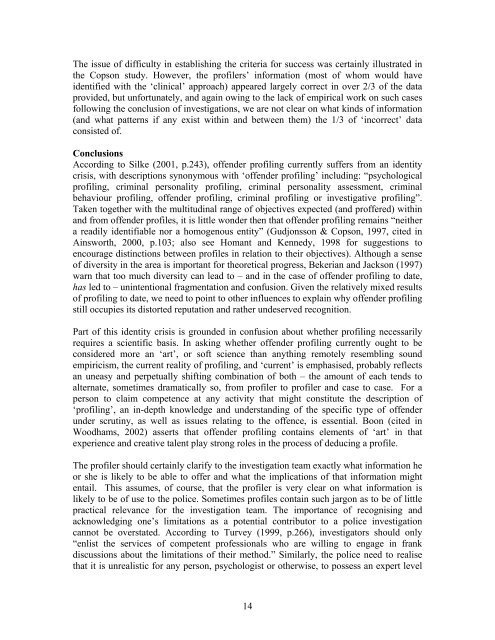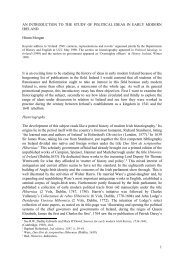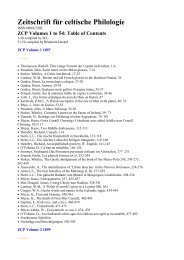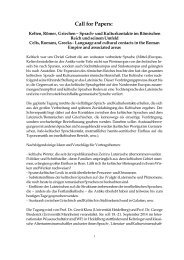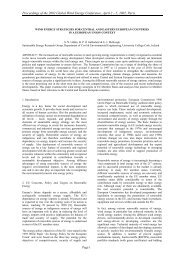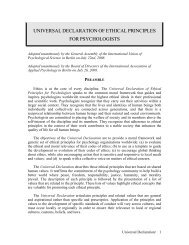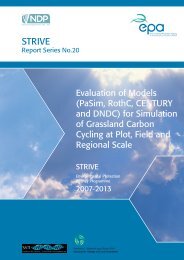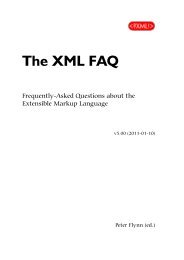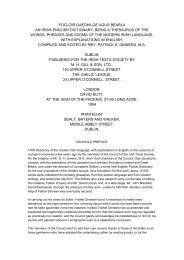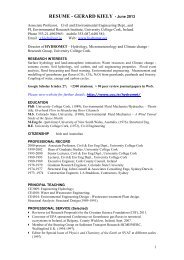Understanding Criminal Behaviour: Beyond Red Dragon - University ...
Understanding Criminal Behaviour: Beyond Red Dragon - University ...
Understanding Criminal Behaviour: Beyond Red Dragon - University ...
You also want an ePaper? Increase the reach of your titles
YUMPU automatically turns print PDFs into web optimized ePapers that Google loves.
The issue of difficulty in establishing the criteria for success was certainly illustrated in<br />
the Copson study. However, the profilers’ information (most of whom would have<br />
identified with the ‘clinical’ approach) appeared largely correct in over 2/3 of the data<br />
provided, but unfortunately, and again owing to the lack of empirical work on such cases<br />
following the conclusion of investigations, we are not clear on what kinds of information<br />
(and what patterns if any exist within and between them) the 1/3 of ‘incorrect’ data<br />
consisted of.<br />
Conclusions<br />
According to Silke (2001, p.243), offender profiling currently suffers from an identity<br />
crisis, with descriptions synonymous with ‘offender profiling’ including: “psychological<br />
profiling, criminal personality profiling, criminal personality assessment, criminal<br />
behaviour profiling, offender profiling, criminal profiling or investigative profiling”.<br />
Taken together with the multitudinal range of objectives expected (and proffered) within<br />
and from offender profiles, it is little wonder then that offender profiling remains “neither<br />
a readily identifiable nor a homogenous entity” (Gudjonsson & Copson, 1997, cited in<br />
Ainsworth, 2000, p.103; also see Homant and Kennedy, 1998 for suggestions to<br />
encourage distinctions between profiles in relation to their objectives). Although a sense<br />
of diversity in the area is important for theoretical progress, Bekerian and Jackson (1997)<br />
warn that too much diversity can lead to – and in the case of offender profiling to date,<br />
has led to – unintentional fragmentation and confusion. Given the relatively mixed results<br />
of profiling to date, we need to point to other influences to explain why offender profiling<br />
still occupies its distorted reputation and rather undeserved recognition.<br />
Part of this identity crisis is grounded in confusion about whether profiling necessarily<br />
requires a scientific basis. In asking whether offender profiling currently ought to be<br />
considered more an ‘art’, or soft science than anything remotely resembling sound<br />
empiricism, the current reality of profiling, and ‘current’ is emphasised, probably reflects<br />
an uneasy and perpetually shifting combination of both – the amount of each tends to<br />
alternate, sometimes dramatically so, from profiler to profiler and case to case. For a<br />
person to claim competence at any activity that might constitute the description of<br />
‘profiling’, an in-depth knowledge and understanding of the specific type of offender<br />
under scrutiny, as well as issues relating to the offence, is essential. Boon (cited in<br />
Woodhams, 2002) asserts that offender profiling contains elements of ‘art’ in that<br />
experience and creative talent play strong roles in the process of deducing a profile.<br />
The profiler should certainly clarify to the investigation team exactly what information he<br />
or she is likely to be able to offer and what the implications of that information might<br />
entail. This assumes, of course, that the profiler is very clear on what information is<br />
likely to be of use to the police. Sometimes profiles contain such jargon as to be of little<br />
practical relevance for the investigation team. The importance of recognising and<br />
acknowledging one’s limitations as a potential contributor to a police investigation<br />
cannot be overstated. According to Turvey (1999, p.266), investigators should only<br />
“enlist the services of competent professionals who are willing to engage in frank<br />
discussions about the limitations of their method.” Similarly, the police need to realise<br />
that it is unrealistic for any person, psychologist or otherwise, to possess an expert level<br />
14


